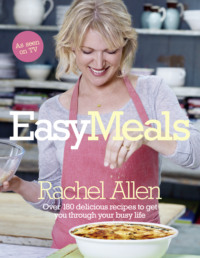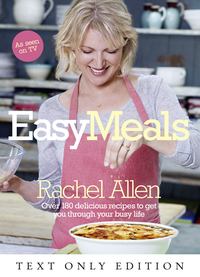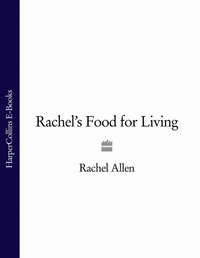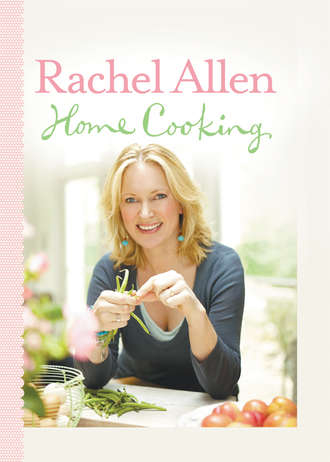
Полная версия
Home Cooking

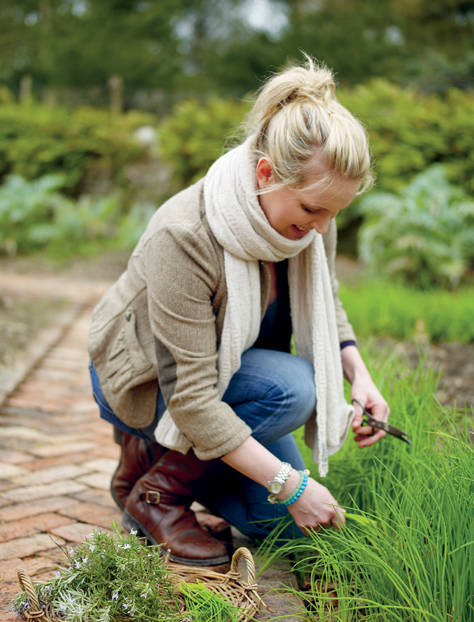
RACHEL ALLEN
Home Cooking

Contents
Cover
Title Page
Introduction
Breakfast
Lunch
Sunday lunch
Suppers
Dessert
Snacks, treats and sweet
Boby purées
Basics
Index
Acknowledgements
Copyright
About the Publisher
Introduction
Home cooking is not about recreating fancy restaurant meals — although that is obviously great fun too — it’s more a way of life. It’s about food that anyone can achieve for friends and family, and taking great pleasure in the preparation as much as in the sharing, and of course the eating! The value of cooking at home goes beyond merely having control over your ingredients (though this is profoundly important for health, wellbeing, and your wallet …), it’s also about gathering your loved ones together to share and enjoy the most fundamental part of life; it’s about teaching your children how to appreciate a home-cooked meal and showing them how much fun cooking can be; it’s about slowing down the busy pace of your life when you can, but also knowing that when there isn’t much time you can still put a loving meal on the table, made by you.
Home cooking is also about the joy of learning old skills and kitchen crafts such as making home-made sweets. It’s about feeling proud as a parent when making by hand your child’s very first foods. It’s about the wonderful kitchen smells and sounds and flavours that you just can’t get any other way.
In this book, you’ll not only find recipes for many occasions from breakfasts to dinners, you’ll also find trusted kitchen tips, such as home freezing, which not only saves time, but money too. You’ll also find hints on menu planning and how to encourage healthy eating habits.
I hope you and your loved ones enjoy every meal together, that you eat well, that you take a moment to appreciate one another’s company around the table, and above all, have fun cooking at home!
Rachel X
p.s. The oven temperatures in this book are for a conventional oven, but if I am using a fan oven, then I usually reduce the temperature by 10 per cent.

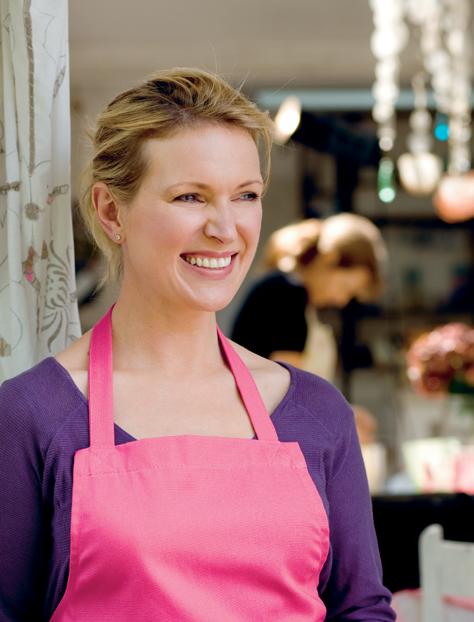
Breakfast
Homemade yoghurt
MAKES ABOUT 425ML (15FL OZ) · VEGETARIAN
Making your own yoghurt is very satisfying as well as being a good way to encourage children to eat it, as they can add their own flavours. It is crucial to use sugar-free yoghurt for the recipe to work. It is also important that the milk and yoghurt mixture stays in a warm, draught-free place like an airing cupboard or beside an Aga or radiator. Pouring into a flask will also help if you have one. Remember to keep 1 teaspoon of the yoghurt back to make the next batch!
1 litre (1¾ pints) whole milk
25g (1oz) skimmed milk powder
1 tsp natural probiotic yoghurt
1 Pour the milk into a large, heavy-based or cast-iron saucepan on a gentle heat. As the milk is beginning to warm up, add the milk powder, stirring to dissolve. Heat the milk until it reads 90°C (194°F) on a cooking thermometer (if judging by eye, the milk will be sweet smelling and just coming to the boil — steaming heavily and frothing around the edges).
2 Remove from the heat and leave to stand for about 15 minutes to cool until it reads 40°C (104°F) on the thermometer (or the milk has stopped steaming and feels just tepid when you dip your finger in and leave it there for a few seconds).
3 Stir in the yoghurt and cover with a double layer of foil. Wrap with a tea towel and leave in a warm place (or in a flask) until the mixture thickens, which will take 4–5 hours. Remove the towel, transfer to a bowl, cover and place in the fridge to cool overnight.
Variations
Apple and sweet geranium yoghurt: Cook 600g (1⅓lb) (about 2) peeled, cored and roughly chopped cooking apples with 50g (2oz) caster or granulated sugar, 1 tablespoon of water and 2 sweet geranium (or mint) leaves for 6–8 minutes until soft. Leave to cool completely and remove the leaves before stirring into the set yoghurt.
Raspberry yoghurt: Make a raspberry coulis (see page 337) and stir into or drizzle over the yoghurt to serve.
Orange curd yoghurt: Ripple a spoonful of orange curd (see page 336) through the yoghurt.
Natural yoghurt with fresh fruits: Serve the yoghurt with one of the fresh fruit salads on page 14.
Natural yoghurt with poached fruits: Serve the yoghurt with some poached fruits (dried or fresh, see pages 44 and 212) or chop them up and stir them into the yoghurt.
Porridge
SERVES 2 · VEGETARIAN
My dad always used to make us eat porridge before going to school, and now I appreciate why. Oats are a great slow-release carbohydrate and so porridge makes a good, hearty breakfast. It can be slightly sinful, depending on what you serve it with, but if you choose healthy toppings it’s a lot more healthy and nutritious than many breakfast cereals.
100g (3½oz) porridge oats
Pinch of salt (optional)
225ml (8fl oz) milk (optional)
1 Place the oats in a medium saucepan, add a pinch of salt (if you wish) and pour over 500ml (18fl oz) water, or a mixture of water and milk.
2 Cook on a low—medium heat, stirring regularly, for 7–10 minutes or until the oats are tender and the porridge creamy and thick. (Feel free to add more liquid if you prefer a thinner consistency.)
3 Serve in warm bowls and make more interesting with one of the tasty additions suggested below.
Additions
* Sweeten with soft brown sugar, honey or maple or golden syrup.
* Add a dash of cream or milk, or drizzle over a little natural yoghurt.
* Try adding dried fruit such as raisins, sultanas, apricots or prunes before cooking the oats.
* Top your porridge with your favourite nuts or seeds for a crunchier texture.
* Try flavouring your porridge with added ground cinnamon, cardamom or nutmeg, either during or after cooking.
* For a serious weekend brunch for grown-ups, you could even go so far as to add a splash of whiskey and cream over your porridge … now that is pure indulgence.
Rachel’s tip
If using pinhead oatmeal, it needs to be soaked overnight in water and then cooked as above, but it may take about 20 minutes.
Crunchy granola
MAKES ABOUT 1.5KG (3LB 5OZ) · VEGETARIAN
A bowl of granola, bursting with different textures and flavours, is a fantastic way to start the day. Serve it either with milk or natural yoghurt and feel free to mix and match the ingredients; you could use rye or barley flakes instead of some of the oat flakes, for instance, or add chocolate chips or dried cranberries. Whatever takes your fancy.
125g (4½oz) butter
150ml (5fl oz) honey
1 tsp vanilla extract
500g (1lb 2oz) rolled oats
50g (2oz) pecan nuts, roughly chopped
150g (5oz) hazelnuts, roughly chopped
75g (3oz) pumpkin seeds
75g (3oz) sunflower seeds
50g (2oz) golden linseeds
100g (3½oz) desiccated coconut
300g (11oz) mixed dried fruit, such as dates, figs, apricots, raisins or sultanas, the larger fruit chopped
1 Preheat the oven to 170°C (325°F), Gas mark 3.
2 Place the butter, honey and vanilla extract in a small saucepan on a low heat and gently melt together. Mix the oats, nuts, seeds and desiccated coconut together in a large bowl. Pour over the melted butter and honey mixture and stir really well to ensure all the dry ingredients are evenly coated.
3 Divide the mixture between two large baking trays and spread in an even layer. Bake in the oven for 20–25 minutes, tossing every 5 minutes, until golden brown. Remove from the oven and leave to cool on the trays, stirring every now and then. (If you transfer it into a deep bowl at this stage, while it is still warm, it will go soggy.)
4 Once completely cool, transfer to a large bowl and stir in your choice of dried fruits. Pour into an airtight container and store at room temperature for up to two months.

Fresh fruit salads
EACH RECIPE SERVES 2 · VEGETARIAN
There’s nothing like a fresh fruit salad to make you feel healthy and invigorated. Eat for breakfast or serve as a starter, simple snack or dessert, either on its own or with natural yoghurt (see page 10 for making your own). First make the fruit juice dressing, then mix with your choice of fruit salad.
Fruit juice dressing
1 tbsp freshly squeezed orange juice
1 tbsp freshly squeezed lemon juice
1 tsp caster sugar or runny honey
2 tbsp finely chopped mint (optional)
Mix the orange juice and lemon juice together in a bowl and stir in the sugar or honey to dissolve. Pour this over your choice of fruit salad below (adding finely chopped mint, if you wish). Stir to combine and serve immediately.
Pink grapefruit and pomegranate
2 pink grapefruit, peeled and segmented Seeds from ½ pomegranate
Mix the pink grapefruit segments and pomegranate seeds together. Stir in the dressing (see above) and serve.
Grape, melon and grapefruit
110g (4oz) seedless red or green grapes (or a mixture), halved
250g (9oz) peeled and deseeded melon, diced
1 grapefruit, peeled and segmented
1 tbsp very finely chopped celery (optional)
Mix the red or green grapes with the melon, grapefruit and celery (if using). Stir in the dressing (see left) and serve.
Tropical fruit mix
1 large orange, peeled and segmented
200g (7oz) peeled and stoned mango, roughly chopped
125g (4½oz) peeled and cored pineapple, roughly chopped
110g (4oz) peeled and deseeded papaya, diced
Seeds and pulp from 1 large passion fruit
Mix the orange, mango, pineapple and diced papaya with the passion fruit. Stir in the dressing (see above left) and serve.
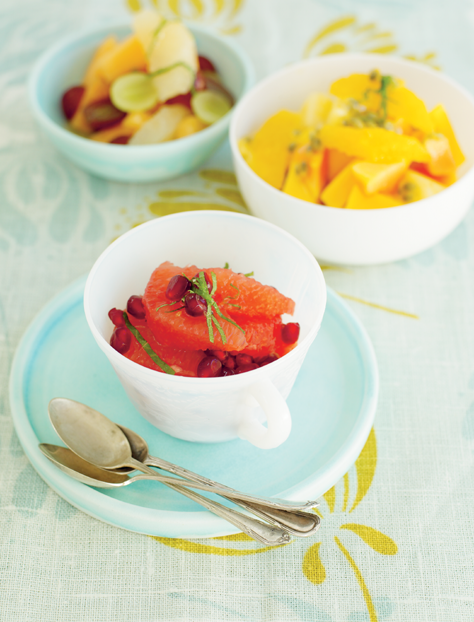
American buttermilk pancakes
MAKES ABOUT 12 PANCAKES · VEGETARIAN
My children and I love making these thick and spongy pancakes (see picture on page 18). The basic recipe is delicious, but the pancakes also taste great with other ingredients added to the batter to flavour them (see the variations opposite). Once cooked and cooled, the pancakes can be kept in the fridge and then warmed through for a few minutes in a hot oven. Spread with a little butter and jam or apple jelly or try one of the toppings suggested below.
150g (5oz) plain flour
2 tsp baking powder
¼ tsp bicarbonate of soda
50g (2oz) caster sugar
2 eggs
150ml (5fl oz) buttermilk or soured milk (see tip on page 24)
25g (1oz) butter, melted and cooled
Sunflower oil, for frying
Icing sugar, for dusting
1 Sift the flour, baking powder and bicarbonate of soda into a large bowl, then stir in the sugar. Whisk the eggs, buttermilk or soured milk and melted butter together in another bowl, then pour into the dry ingredients, whisking all the time until you have a smooth batter. The batter is now ready to use or may be stored in the fridge overnight.
2 When you are ready to cook the pancakes, fold your chosen flavouring (if using — see opposite) into the batter. Place a large frying pan on a medium heat and oil it very lightly (I usually pour the oil onto a piece of kitchen paper and rub it on). Working in batches, drop large spoonfuls (about 50ml/2fl oz) of the pancake batter into the pan, spacing them apart to allow for spreading while cooking.
3 Cook on one side for 1–2 minutes until bubbles appear on the upper surface, then flip over with a fish slice or palette knife and cook on the other side for a further 1–2 minutes until golden brown on both sides. Repeat with any remaining mixture, keeping any cooked pancakes warm in a low oven (cover with foil) as you go.
4 Serve dredged with icing sugar and your choice of toppings from below.
Toppings
* Crème fraîche or Greek or natural yoghurt
* Slices of mango or strawberry, or pomegranate seeds
* Honey or maple or golden syrup
* Chopped nuts, such as pecans, hazelnuts or almonds
* Pumpkin or sunflower seeds
* Top with banana slices and toffee sauce (see page 337)
Variations
Choose one of the following to fold into the batter once it’s made:
Banana pancakes: 1 large or 1½ small—medium bananas, mashed (giving 150g/5oz mashed weight)
Berry pancakes: 75g (3oz) fresh or frozen (and defrosted) berries of your choice
Chocolate chip pancakes: 75g (3oz) chocolate chips (dark or milk chocolate)
Dried fruit pancakes: 75g (3oz) dried fruit such as raisins, sultanas, apricots or cranberries (chopped if large)
Cinnamon pancakes: 1½ tsp ground cinnamon
Fresh apple muesli
SERVES 2 · VEGETARIAN
This delicious wet muesli is so easy to assemble and more nutritious than shop-bought dried muesli. You could use other fruit instead of apples — whatever is to hand.
4 tbsp oat flakes
2 eating apples
1 tsp honey
1 tbsp single or regular cream (optional)
1 Measure 3 tablespoons of water into a bowl and sprinkle in the oats. Leave for a few minutes to soak.
2 In the meantime, coarsely grate the apples with the skin still on and avoiding the core. Stir into the softened oats, along with the honey. Taste, adding a little more honey to sweeten, if necessary. Spoon into bowls and serve immediately, drizzled with cream, if you wish.
Variations
Apple and cinnamon muesli: Stir a pinch of cinnamon into the water before adding the oats.
Raspberry and orange muesli: Substitute the apples with 50g (2oz) crushed raspberries and stir into the oats with the finely grated zest of 1 small orange.
Apple, blackberry and pecan nut muesli: In addition to the apple, stir 25g (1oz) blackberries into the oats with 2 teaspoons of finely chopped pecan nuts.
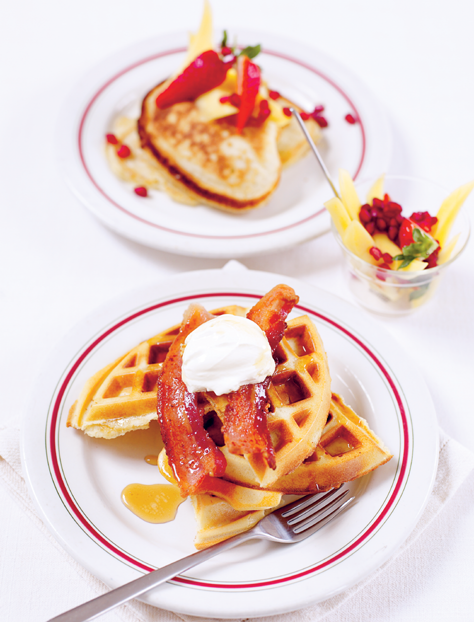
Waffles
MAKES 16–20 WAFFLES · VEGETARIAN
(WITH NON-VEGETARIAN VARIATIONS)
Waffles are a perfect weekend breakfast, but they can make an excellent snack at any time of day. They go well with so many different toppings, sweet or savoury. I’ve listed some of my favourites below.
400g (14oz) plain flour
2 tsp baking powder
2 tsp salt
100g (3½oz) caster sugar
4 eggs
200g (7oz) butter, melted and cooled
600ml (1 pint) milk
Icing sugar, for dusting (optional)
1 Sift the flour and baking powder into a large bowl. Add the salt and sugar and mix well together. Whisk the eggs in another bowl, then stir in the melted butter and milk. Pour the wet ingredients into the centre of the dry ingredients, whisking all the time until you have a smooth batter.
2 Heat the waffle machine. Using a ladle, pour some batter into the machine — don’t fill it too full. Close the lid and cook for 4–5 minutes or following the manufacturer’s instructions, or until the waffles are golden brown and cooked through. Remove the waffles, dredge with icing sugar (if using) and add your choice of topping to serve.
Toppings
The quantities are for 1 waffle.
Bacon and maple syrup: Serve each waffle with 1–2 pieces of back or streaky bacon, a drizzle of maple syrup and a dollop of soured cream.
Peanut butter and jam: Spread 1 tablespoon of peanut butter or homemade nut butter (see page 252) over the waffle and blob 1 tablespoon of raspberry or strawberry jam on top.
Kiwi fruit and raspberries: Scatter over 1 chopped kiwi fruit and a small handful of raspberries. Drizzle with a little runny honey and add a dollop of Greek or natural yoghurt.
Classic French omelette
SERVES 1–2 · VEGETARIAN (WITH NON - VEGETARIAN VARIATIONS)
The ultimate fast food, an omelette is perfect at any time of day, either on its own or with a crisp green salad. It is incredibly versatile, too. Try the variations listed here.
2 eggs
2 tsp milk
Salt and freshly ground black pepper
2 tsp butter
1 tbsp olive oil
1 Place a 23cm (9in) non-stick or cast-iron frying pan on a high heat until very hot. (The omelette should take only about 40–45 seconds to cook if the pan is hot enough.) Place the eggs in a bowl, add the milk, season with salt and pepper and beat together until thoroughly mixed.
2 Add the butter and olive oil to the pan and as soon as the butter sizzles and starts to turn brown, pour in the egg mixture. It will start to cook immediately, so using a plastic fish slice or wooden spatula, quickly pull the edges of the omelette towards the centre, tilting the pan so that the uncooked egg runs to the sides. Continue until most of the egg is set and will not run any more — the omelette may need to cook for a further 5 seconds to slightly brown the bottom. The centre should still be soft and moist. If you are using a filling (see below), then add it in a line along the centre now (except for those added to the egg mixture at the start).
3 To fold the omelette, flip the edge closest to the handle into the centre, then tilt the pan so that it is almost perpendicular to the plate so that the opposite edge of the omelette folds in and the omelette flips over. As you do this, slide the omelette out of the pan and onto the plate, and serve immediately.
Variations
Alpine breakfast omelette: To the egg mixture add 25g (1oz) grated Emmental and Gruyère cheese, 25g (1oz) soft and creamy goat’s cheese and 1 teaspoon of finely chopped chives and beat all the ingredients together.
Courgette and herb omelette: Sauté 50g (2oz) finely diced courgette with 1 finely chopped clove of garlic and a small pinch of salt and pepper in 15g (½oz) of butter or 2 tablespoons of olive oil for about 5 minutes until soft and golden. Drain on kitchen paper and leave to cool. Stir into the egg mixture along with 2 tablespoons of finely chopped herbs (such as mint, marjoram or basil).
Bacon and mushroom omelette: Stir 1 teaspoon of finely chopped chives into the egg mixture before cooking. Place 2 rashers of grilled bacon and 1 fried or roasted flat mushroom in the middle of the omelette before folding over. (This is a great way of using up leftover ingredients from a fried breakfast.)
Smoked salmon and goat’s cheese omelette: Add 25g (1oz) finely diced smoked salmon and 25g (1oz) soft, mild goat’s cheese (or cream cheese for an even milder flavour) to the middle of the omelette before folding over.
French toast
SERVES 4 · VEGETARIAN
The French call this pain perdu (‘lost bread’). It is made with slightly stale, leftover bread that you would otherwise throw out, but if you have only fresh bread to hand, leave it out overnight to dry out.
25g (1oz) butter
2 eggs
2 tbsp single or regular cream (or milk)
Pinch of salt
4 slices of white or brown bread
Icing sugar, for dusting
Honey or golden or maple syrup, to serve
1 Place a large, non-stick or cast-iron frying pan on a medium heat and add the butter. While it is melting, whisk the eggs with the cream or milk and salt in a wide, shallow bowl. Soak the bread in the egg mixture for a few seconds on each side and place in the hot pan.
2 Cook for 1–2 minutes on each side until deep golden in colour, then place on warm plates, dredge generously with icing sugar and serve with honey or golden or maple syrup drizzled over.
Variations
Spicy French toast: Add ground spices such as cinnamon, nutmeg or mixed spice to the egg mix before soaking the bread.
Fruity French toast: Add 1 small mashed banana or 50g (2oz) mashed raspberries or strawberries to the egg mix.





